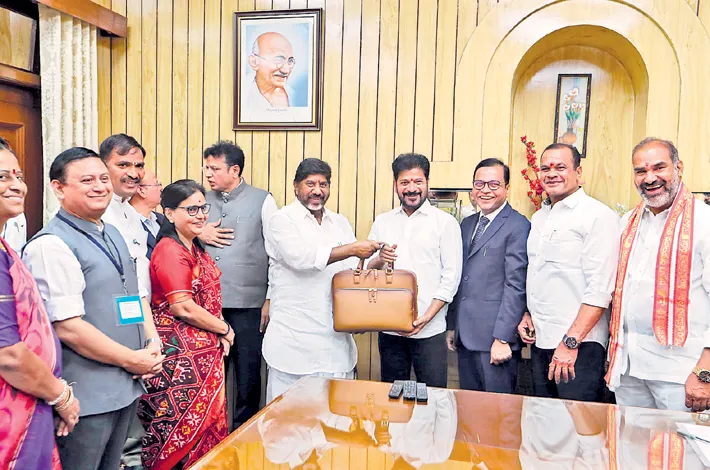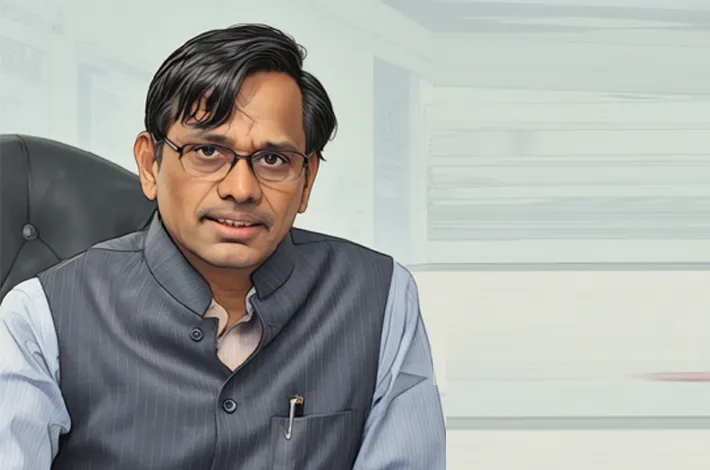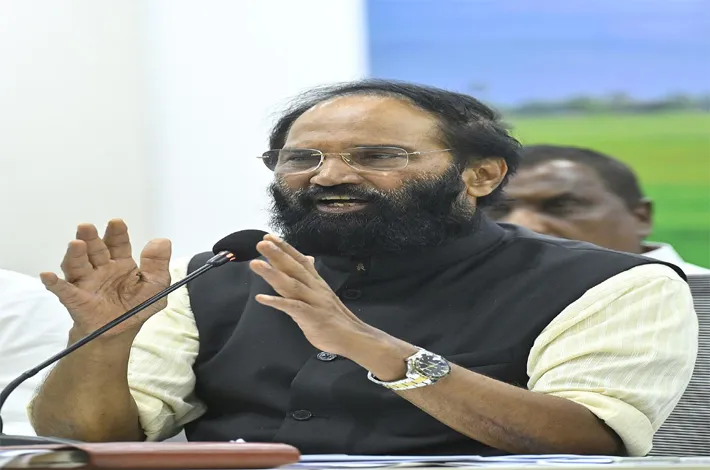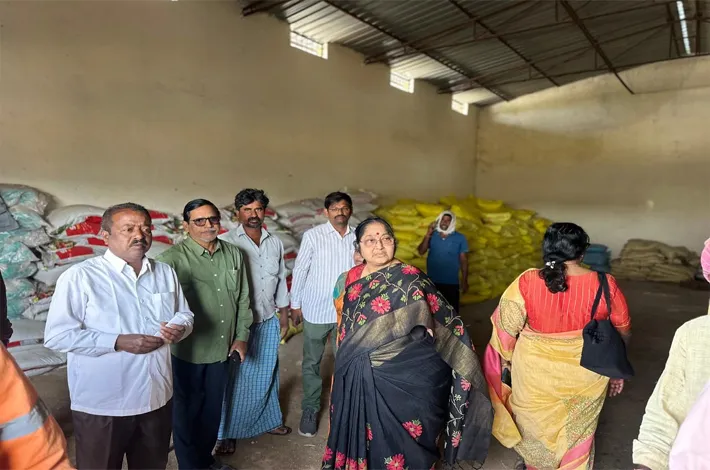Bhatti unveils a budget of Rs 3,04,965 cr
20-03-2025 12:00:00 AM

Energy Goals
The budget projects a GSDP of ₹16.12 lakh crore, with a growth rate of 10.1%, higher than the national average. An unexpected detail is the state's ambition to become a $1-trillion economy in 10 years, supported by the Mega Master Plan 2050, focusing on technology and renewable energy. Energy initiatives include a target of 20,000 MW of renewable energy by 2030, expanding to 40,000 MW by 2035, with ₹11,500 crore allocated for farmer power subsidies.
Revenue and Financial
The budget anticipates Central grants of ₹22,782 crore and a share in Central taxes of ₹29,899 crore. The state's own revenues are projected at ₹1.45 lakh crore, with key income sources including the excise department (₹27,623 crore) and vehicle taxes (₹8,535 crore). These figures reflect a balanced approach to mobilizing resources while managing fiscal discipline, especially given the challenges of funding welfare schemes and infrastructure development.
metro india news I hyderabad
Deputy Chief Minister and Finance Minister Mallu Bhatti Vikramarka unveiled a budget of Rs 3,04,965 crore for the fiscal year 2025-26. In his budget speech that began around 11 am and concluded at 12.50 pm, he emphasized welfare, agriculture, rural development, and infrastructure expansion. Highlighting a revenue expenditure of Rs 2,26,982 crore and a capital expenditure of Rs.36,504 crore.
A significant portion of the budget—Rs.56,000 crore—is allocated for the implementation of the Congress party’s six poll guarantees, which include direct financial assistance, free electricity, social security pensions, and housing support. Meanwhile, the state is expected to raise Rs.64,000 crore through open market borrowings to meet developmental commitments.
The 2025-26 budget prioritized farmer welfare, rural development, education, and social justice, ensuring equitable economic growth. This budget reflected a balanced approach to welfare, agriculture, infrastructure, and human development, ensuring inclusive and sustainable growth for Telangana.
The 2025-26 budget aims to balance welfare and economic expansion, envisioning a five-fold growth of Telangana’s economy to reach $1 trillion over the next decade, stressed Bhatti.
Welfare and Rural Development
The Telangana government has emphasized its commitment to Social Justice and Rural Empowerment, with major allocations aimed at Scheduled Castes (SC), Scheduled Tribes (ST), and rural development initiatives. A total of Rs.40,232 crore has been set aside for SC Welfare, focusing on education, employment, and housing support, while Rs.17,169 crore has been allocated for ST Welfare, which includes key projects like the Indira Giri Jalavikasam Scheme, providing solar-powered irrigation for tribal farmers. Additionally, Rs.31,605 crore has been earmarked for Panchayati Raj & Rural Development, supporting infrastructure, employment generation under MNREGS, and women empowerment through the Indira Mahila Shakti Mission.
Agriculture, Irrigation, and Energy
Recognizing the crucial role of agriculture, the budget has allocated Rs.24,439 crore for Agriculture & Farmer Welfare, which includes the Rythu Bharosa Scheme, providing Rs.12,000 per acre annually, and a Rs.500 per quintal bonus for fine variety paddy.
To improve water access for farmers, Rs.23, 373 crore has been set aside for Irrigation & Command Area Development, ensuring the completion of key irrigation projects such as the Palamuru Ranga Reddy Project and Udaya Samudram-Brahmana Velamala Lift Irrigation Project to supply water to drought-prone areas. In the energy sector, the government has allocated Rs.21,221 crore to expand renewable energy under the Clean & Green Energy Policy 2025, along with providing 200 units of free electricity to 50 lakh households through the Gruha Jyothi scheme.
Infrastructure, Education, and Healthcare
Urban development and road infrastructure are a priority, with Rs.17,677 crore allocated for Municipal Administration & Urban Development, including the H-CITI Plan for Hyderabad’s expansion and the development of India’s first Net-Zero Future City. The Roads & Buildings sector has received Rs.10,188 crore, intending to construct 17,000 km of rural roads by 2028.
Meanwhile, investments in education and healthcare are substantial, with Rs.23,108 crore for Education, supporting the Young India Integrated Residential Schools and digital education initiatives, while Rs.12,393 crore has been designated for Health, Medical & Family Welfare, including Rs.2,700 crore for Osmania Hospital modernization and the expansion of Rajiv Arogyasri Scheme, increasing free medical coverage from Rs.5 lakh to Rs.10 lakh per family.
Fiscal Management and Economic Growth
The Telangana government is focusing on maintaining fiscal discipline while ensuring robust economic growth. The budget projects own tax revenue at Rs.1,45,420 crore, indicating a positive economic outlook. The state's per capita income stands at Rs.3, 79,751, with a 9.6% growth rate, while the GSDP recorded 10.1% growth at Rs.16,12,579 crore in 2024-25.
However, Telangana’s outstanding liabilities stood at Rs.4.51 lakh crore in 2024-25 and are expected to cross Rs.5 lakh crore in the coming fiscal year. The government is negotiating with financial institutions to lower borrowing costs and extend repayment periods, ensuring financial stability while funding developmental projects across sectors.
The Finance Minister raised significant concerns regarding the declining share of tax devolution for Southern states, including Telangana. Under the 14th Finance Commission, Telangana received 2.437% of funds, which decreased to 2.102% under the 15th Finance Commission. This reduction has impacted the state's fiscal resources, prompting proposals for reform. The minister advocated for increasing Central tax devolution from the current 41% to 50% for the 16th Finance Commission, arguing for a more equitable distribution.








